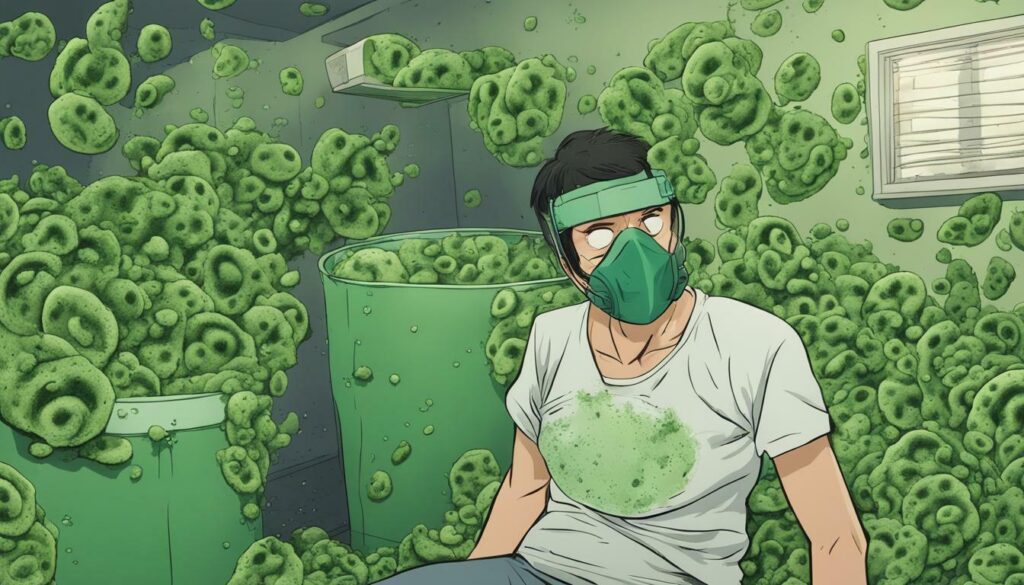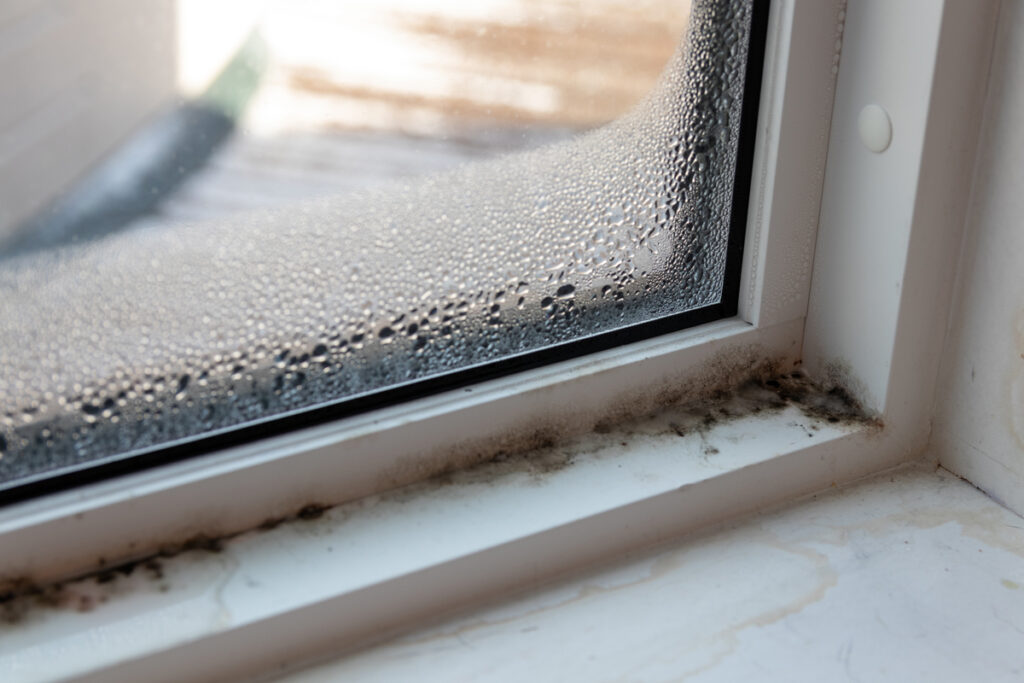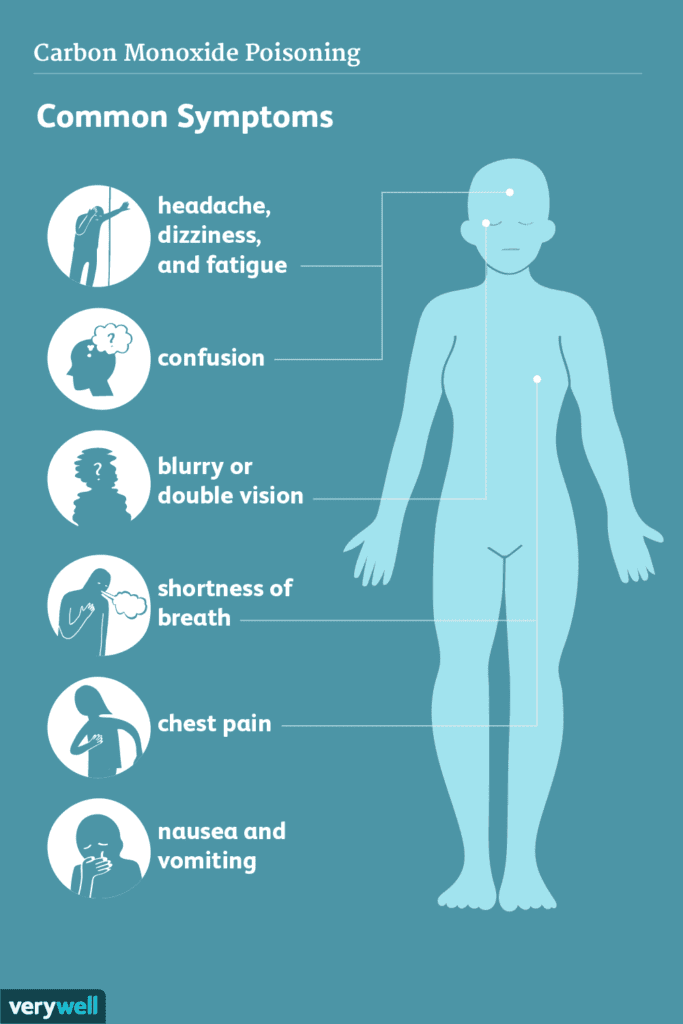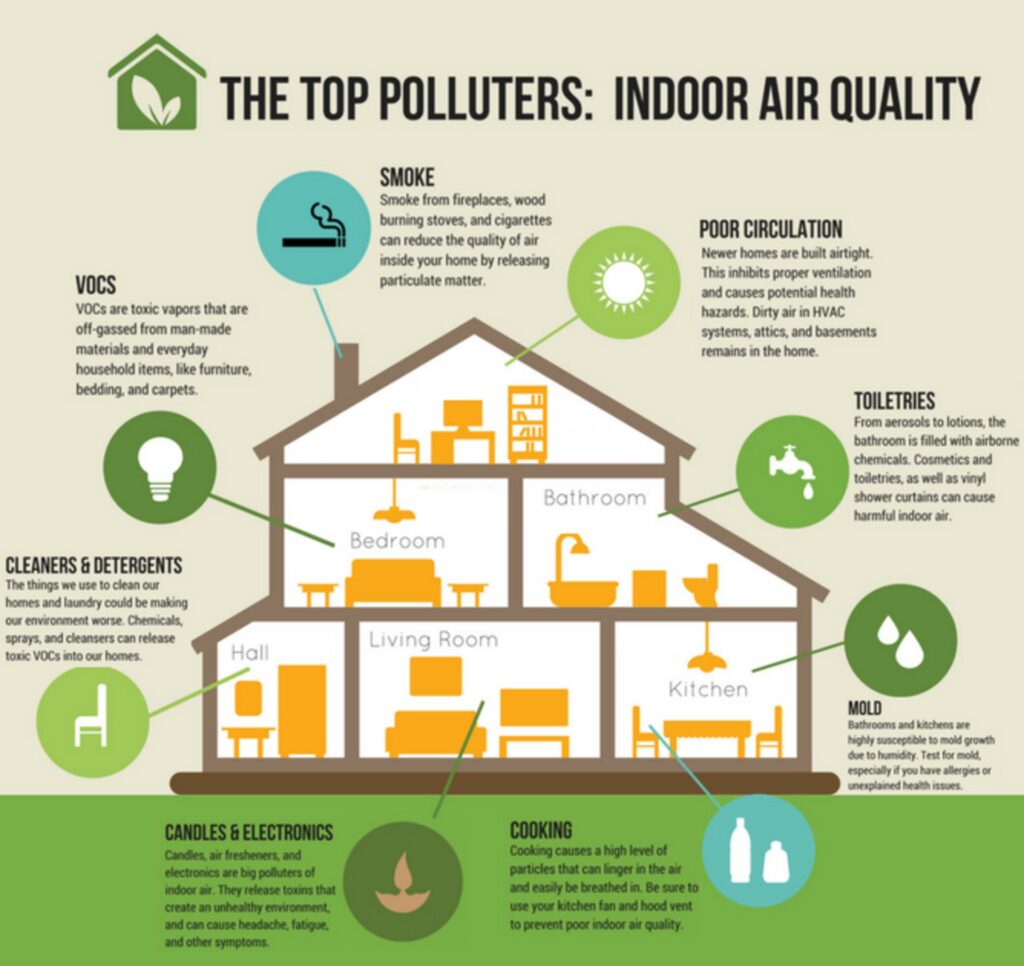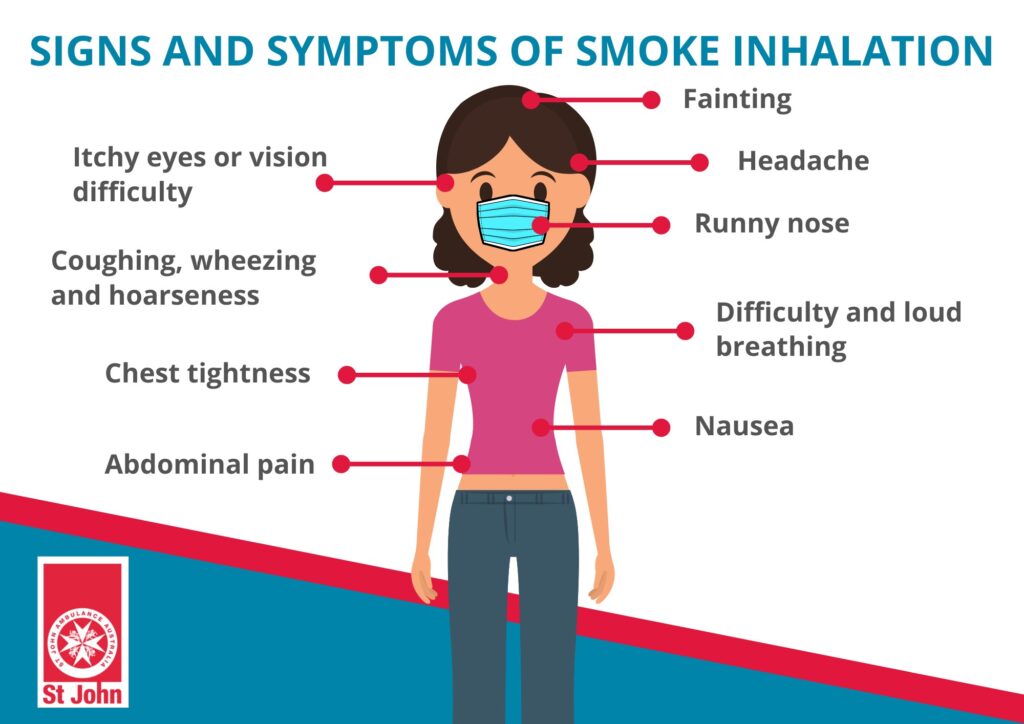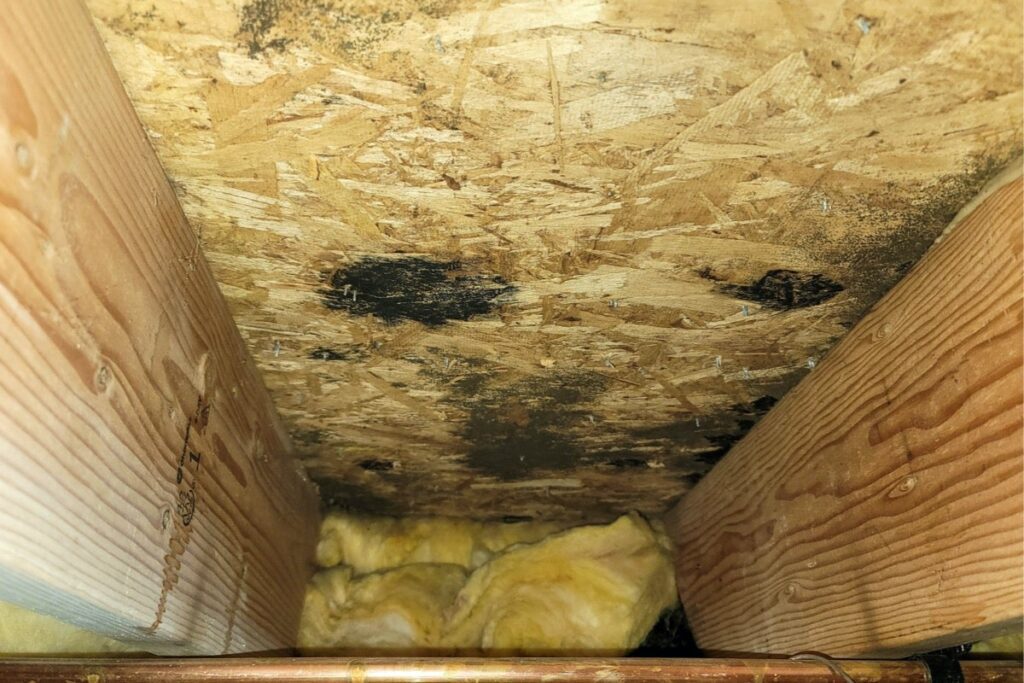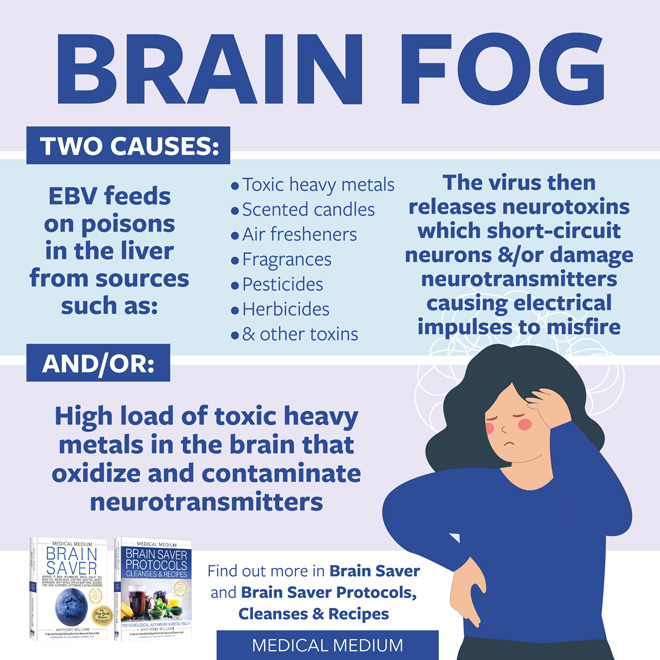If you’ve ever experienced mold growth in your home, you may know that it can be a nightmare to clean up. However, what you may not know is just how quickly mold can impact your health. Mold exposure can lead to a range of symptoms, from mild allergic reactions to severe respiratory issues. Understanding the potential health effects of mold is essential to protecting yourself and your loved ones.
Key Takeaways
- Mold exposure can lead to various health issues, including respiratory problems and allergic reactions.
- It’s important to recognize the symptoms of mold exposure and take timely action to prevent further health complications.
- Preventative measures, such as improving indoor air quality and seeking professional help when necessary, can help protect your health from mold-related concerns.
Understanding Mold Exposure Symptoms
If you’ve been exposed to mold, you may experience a range of symptoms that can impact your health. These symptoms can vary depending on the type of mold you’ve been exposed to, the length of exposure, and your individual sensitivity. Recognizing these symptoms early on is crucial to preventing further health complications.
Physical symptoms of mold exposure can include:
- Coughing
- Sneezing
- Runny or stuffy nose
- Sore throat
- Watery eyes
- Headaches
- Fatigue
In addition to these physical symptoms, mold exposure can also lead to respiratory problems such as difficulty breathing, chest tightness, and wheezing. If you’re experiencing any of these symptoms, it’s important to seek medical attention promptly.
It’s worth noting that some individuals may not experience any symptoms at all, even if they’ve been exposed to mold. This can make it difficult to determine if there is mold present in your environment. If you suspect that mold may be present, it’s important to have your space inspected by a professional.


Health Effects of Mold: An Overview
Mold exposure can have serious consequences for your health if left unchecked. The effects of mold on the body can range from mild, such as nasal congestion and coughing, to severe, such as respiratory problems and immune system disorders.
If you are exposed to mold for extended periods, it can lead to chronic health problems, including allergies, asthma, and even neurological issues.
The health effects of mold can vary depending on the individual and the type and amount of mold they are exposed to. Certain people, such as those with weakened immune systems or respiratory issues, may be more susceptible to the negative effects of mold exposure.
| Health Effects of Mold | Symptoms |
|---|---|
| Allergies | Hay fever-like symptoms such as sneezing, runny nose, red eyes, and skin rash |
| Asthma | Chest tightness, wheezing, and shortness of breath |
| Respiratory Infections | Coughing, phlegm production, and chest discomfort |
| Immune System Disorders | Fever, fatigue, and headache |
It is important to be aware of the potential health risks associated with mold exposure and take action as soon as possible to prevent further complications.
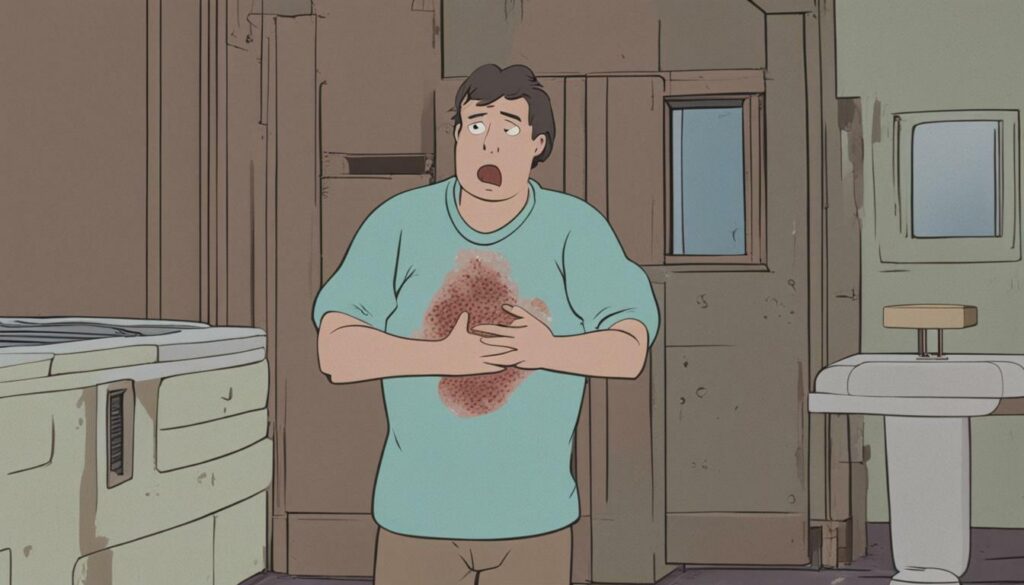

To protect yourself from the health effects of mold, it is essential to maintain a healthy indoor environment. Regularly inspecting your home for mold growth, fixing leaks and water damage immediately, and ensuring proper ventilation are all preventative measures you can take. If you suspect mold growth, seek professional help to remedy the situation as soon as possible.
Mold-Related Illnesses: What You Need to Know
If you have been exposed to mold, it is important to be aware of the potential health risks. Mold-related illnesses can range from mild to severe, and if left untreated, can lead to chronic health problems.
Allergic bronchopulmonary aspergillosis (ABPA) is a condition that can arise from mold exposure. It is an allergic reaction to a fungus called Aspergillus, which can be found in damp environments. Symptoms include wheezing, coughing, and shortness of breath. If left untreated, ABPA can cause permanent lung damage.
Asthma can also be triggered by mold exposure. Mold spores can irritate the airways and cause asthma attacks, leading to symptoms such as coughing, wheezing, and difficulty breathing. In some cases, asthma symptoms may be severe and require emergency medical attention.
Hypersensitivity pneumonitis is another condition that can be caused by mold exposure. It is an inflammatory lung disease that occurs when the lungs become inflamed from repeated exposure to inhaled particles, such as mold spores. Symptoms include coughing, shortness of breath, and fever. If left untreated, hypersensitivity pneumonitis can cause permanent lung damage.
If you are experiencing any of these symptoms, it is important to seek medical attention right away. Your doctor can help you determine the cause of your symptoms and provide appropriate treatment.


Recognizing Toxic Mold Symptoms
If you suspect that your home or workplace has toxic mold, it’s important to be aware of the symptoms that could signal exposure. Toxic mold symptoms can vary depending on individual sensitivity and the duration of exposure. However, here are some common symptoms:
- Headaches: Toxic mold exposure can trigger headaches, which are often persistent and not relieved by medication.
- Respiratory problems: Exposure to toxic mold can cause respiratory problems, such as shortness of breath, wheezing, and difficulty breathing.
- Fatigue: Toxic mold exposure can cause extreme fatigue, making it difficult to carry out daily tasks.
- Cognitive problems: Some toxic molds can produce mycotoxins that affect cognitive function, memory, and attention span.
- Body aches: Toxic mold exposure can cause muscle and joint pain, along with cramps and twitching.
If you experience any of these symptoms, it’s essential to seek medical attention immediately. Delaying treatment can exacerbate symptoms and potentially lead to more severe health problems.
It’s also important to note that toxic mold exposure can affect different people in different ways. Some individuals may have no reaction at all, while others may experience severe symptoms.
In the next section, we’ll explore how mold can directly impact the respiratory system, leading to various respiratory problems. Keep reading to learn more about mold and respiratory issues.


How Mold Can Cause Respiratory Problems
If you’ve ever experienced respiratory problems, you know how concerning they can be. But did you know that mold can be a leading cause of respiratory issues?
When mold spores are released into the air, they can be inhaled into the lungs. For individuals with pre-existing respiratory conditions, like asthma or COPD, mold exposure can trigger an attack and make symptoms worse. Even if you don’t have a pre-existing condition, mold can still irritate your airways and cause or contribute to respiratory problems.
Some of the respiratory problems associated with mold exposure include coughing, wheezing, shortness of breath, and chest tightness. In severe cases, mold exposure can even lead to the development of chronic respiratory conditions like bronchitis or pneumonia.
It’s important to note that not all molds are created equal when it comes to respiratory problems. Some molds, like Stachybotrys chartarum (also known as black mold), have been linked to more severe respiratory issues due to the presence of mycotoxins.
The best way to protect your respiratory health from mold is to prevent mold growth in your home or workplace. If you do notice mold, it’s important to take action quickly to prevent the spread of spores and seek professional help for remediation.


Allergic Reactions to Mold: What You Should Know
If you experience symptoms such as sneezing, coughing, or skin rashes when you’re in a moldy environment, you may have mold allergies.
Mold spores act as allergens in some people, causing allergic rhinitis, also known as hay fever. Symptoms may include a runny nose, sneezing, and nasal congestion. Some individuals may experience skin reactions, such as hives or rashes, when they come into contact with mold.
If you suspect you have mold allergies, it’s essential to get tested by an allergist to confirm your diagnosis and determine the specific type of mold you’re allergic to. Once diagnosed, you can take steps to avoid exposure, such as keeping your home dry and free of mold.


If you suspect you have mold-related allergies, it’s essential to seek medical attention and take steps to reduce exposure to mold spores to prevent further health complications.
Understanding Mold Toxicity
When mold grows in your home or workplace, it releases spores that can cause a range of health problems. But some types of mold produce mycotoxins, which can be particularly dangerous to your health. These toxins are released into the air as a mold defense mechanism and can cause significant health issues when inhaled or ingested. If you suspect that you have toxic mold in your environment, it is crucial to take immediate action to protect yourself and those around you.
The symptoms of mold toxicity can range from mild to severe and are similar to other mold exposure symptoms, including respiratory problems, skin irritation, and fatigue. However, toxic mold symptoms can also include neurological symptoms such as memory loss, difficulty concentrating, and confusion. The severity of the symptoms will depend on the type of mold present, the level of exposure, and individual susceptibility.
The most common types of mold associated with mycotoxin production are Stachybotrys chartarum (black mold), Aspergillus, and Penicillium. Exposure to these molds has been linked to serious health issues such as liver damage, cancer, and autoimmune diseases. It is vital to seek professional help if you suspect toxic mold exposure to ensure proper remediation and protection of your health.


Identifying Mold Sickness and Its Symptoms
Exposure to mold can cause a range of symptoms that collectively are referred to as mold sickness. These symptoms can range from mild to severe and often mimic those of other common illnesses, making it challenging to identify mold toxicity.
The symptoms of mold sickness can include fatigue, headaches, allergies, respiratory issues, and immune system disturbances. You may also experience skin irritation, dizziness, or difficulty concentrating. If you are experiencing any of these symptoms, it’s important to consider the possibility of mold exposure and seek medical assistance immediately.
It’s essential to understand that mold sickness can have a cumulative effect on your health. Prolonged exposure to mold can lead to chronic health issues, making early detection and treatment critical. In severe cases, mold exposure can lead to neurological problems and even death.
Remember, mold sickness is not something to take lightly. If you suspect that you or a loved one is experiencing symptoms of mold sickness, it’s crucial to take action promptly. By seeking professional assistance and implementing preventative measures, you can protect your health and minimize the impact of mold exposure on your well-being.


Steps to Take for Mold-Related Health Concerns
If you suspect mold exposure is affecting your health, taking immediate action is crucial. There are several steps you can take to prevent mold from impacting your health.
- Identify and remove the source: First and foremost, it’s important to identify and remove the source of the mold. This may involve fixing leaks, drying water-damaged areas, and removing any visible mold growth.
- Improve indoor air quality: Mold thrives in damp and humid environments, so keeping your indoor spaces dry and well-ventilated is key. Use dehumidifiers, air conditioners, and exhaust fans to maintain appropriate levels of humidity and air flow.
- Consider professional mold remediation: If the mold growth is extensive or if you have underlying health conditions, it’s best to seek professional help. A professional can assess the extent of the damage and safely remove the mold to prevent further health concerns.
- Take preventative measures: Preventing mold growth is the best way to protect your health. Regularly clean and dry moisture-prone areas, fix any leaks, and use mold-resistant products in your home.
By taking these steps, you can reduce the likelihood of mold-related health issues and protect yourself and your loved ones. Don’t wait until it’s too late – take action now to protect your health.
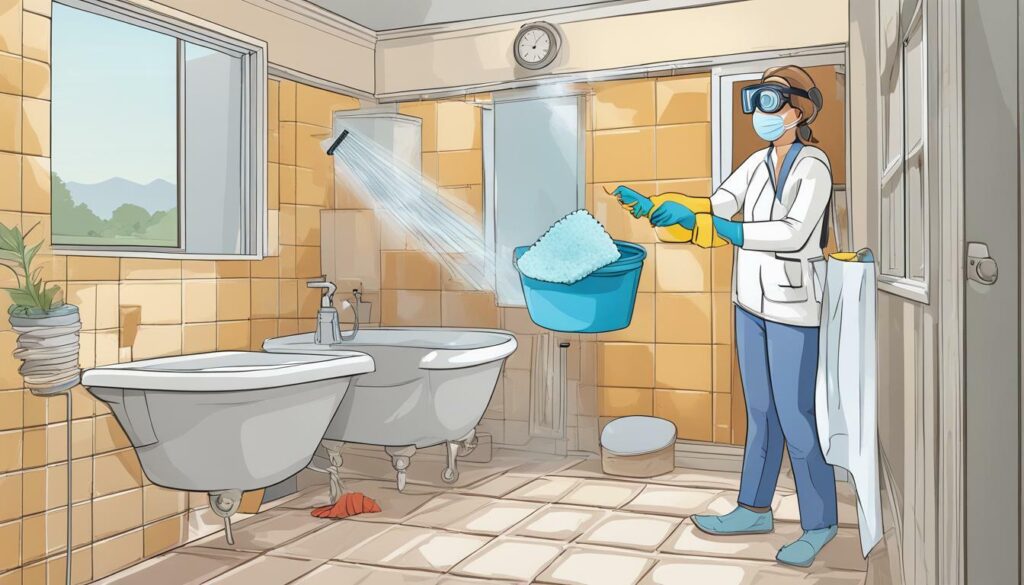

The Importance of Timely Action
When it comes to mold exposure, time is of the essence. Delaying treatment or remediation can have serious consequences on your health. If left untreated, mold exposure can worsen and lead to more severe illnesses.
Ignoring symptoms such as coughing, sneezing, or difficulty breathing can lead to long-term respiratory problems. Mold-related illnesses such as ABPA and hypersensitivity pneumonitis can also progress if left untreated, causing irreversible damage to the lungs.
Furthermore, toxic molds can produce mycotoxins that can impair cognitive function and weaken the immune system. Delaying treatment can allow these toxins to accumulate in the body, causing more severe symptoms such as memory loss or chronic fatigue syndrome.
It’s crucial to take swift action when you suspect mold exposure to protect your health. Seek professional help for mold remediation and medical attention for any symptoms you may be experiencing. Don’t wait until it’s too late!


Conclusion: Protecting Your Health from Mold
Now that you understand how quickly mold can make you sick and the various health issues associated with mold exposure, it’s important to prioritize your health by taking preventative measures. Make sure to keep your home dry and well-ventilated to prevent mold growth. If you notice any signs of mold, such as a musty smell or visible growth, take immediate action and seek professional assistance.
It’s also vital to recognize the different symptoms of mold exposure and seek medical attention if you experience any of them. Remember, mold-related illnesses can pose long-term health risks, so timely action is crucial.
By taking these steps, you can protect yourself and your loved ones from the dangers of mold exposure. Don’t hesitate to seek professional help from experienced mold remediation specialists to ensure the safety and health of your home.
FAQ
Q: How quickly can mold make you sick?
A: Mold can make you sick in as little as 24 to 48 hours of exposure.
Q: What are the symptoms of mold exposure?
A: Symptoms of mold exposure can include coughing, sneezing, headaches, difficulty breathing, fatigue, and skin irritation.
Q: What are the health effects of mold?
A: Mold can have various health effects, including respiratory issues, allergies, and potential long-term risks to your overall well-being.
Q: What are some mold-related illnesses?
A: Mold-related illnesses can include allergic bronchopulmonary aspergillosis (ABPA), asthma, and hypersensitivity pneumonitis.
Q: What are the symptoms of toxic mold exposure?
A: Toxic mold exposure can cause neurotoxic effects, leading to cognitive issues, fatigue, and overall health problems.
Q: How does mold cause respiratory problems?
A: Mold spores can irritate the airways and trigger asthma attacks or other respiratory conditions, especially in individuals with pre-existing respiratory issues.
Q: What are the allergic reactions to mold?
A: Mold spores can act as allergens, causing allergic rhinitis, skin rashes, and other allergic responses.
Q: What is mold toxicity?
A: Mold toxicity refers to the potential dangers associated with mycotoxins produced by certain molds and their impact on human health.
Q: What are the symptoms of mold sickness?
A: Mold sickness can cause symptoms such as fatigue, headaches, immune system disturbances, and overall physical discomfort.
Q: What steps can I take to prevent mold-related health concerns?
A: To prevent mold-related health issues, you can take steps such as preventing mold growth, improving indoor air quality, and seeking professional help for remediation.
Q: Why is timely action important when dealing with mold-related health concerns?
A: Delaying treatment or remediation for mold-related health concerns can worsen symptoms and increase the risk of developing more severe illnesses.

